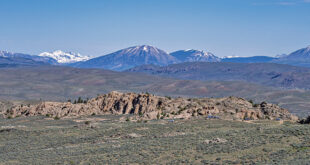Math geeks say numbers can be poetry. I’m not there but numbers certainly can tell a story. This week it seems numbers that might individually be interesting by themselves collectively show tensions escalating in our home. The numbers not only tell a story but also provide a warning. And these are numbers coming to the forefront just this week…
—Hundreds, if not thousands, of RVs lined up this summer to drop their waste at the dump station located near the Crested Butte wastewater treatment plant. It is also located near a growing neighborhood. A petition with 150 signatures asking the dump station be moved was submitted to the Town Council.
—The town of Crested Butte has distributed 80,000 plastic dog poop bags so far this year.
—There are two ranchers, one bridge and sometimes hundreds of recreationists crossing paths almost every day out Brush Creek by Strand Hill.
—The median price of a house in Crested Butte is now more than $1.2 million and increasing. The median income of people living in town is a fraction of what it would take to afford such a place.
—While local trailheads see hundreds of hikers and bikers on a regular basis in the summer, the acceptance of e-bikes is expected to grow that number—and the Forest Service is taking public comment on whether to allow such e-bikes to use the local trails.
—Blue Mesa is approaching a fill at about 50 percent capacity while the Taylor River is flowing at less than 100 cfs. While some precipitation is expected Sunday, the forecast for October calls for generally warm and dry weather. As more people move here, there is less water.
—As the town gets more developed there are fewer places to store snow in the winter. Council has been made aware that a few lots might have to be purchased soon and they won’t be cheap.
—The current Crested Butte Community School in-person student count is at about 770, with the total count including online Pathways students at 799.
So it is that time to take a breath, and remember the long tradition in this community to not ignore the numbers but try to guide them. And normally we do a pretty good job. But that takes relationships and partnerships of sometimes people with disagreeing views coming to common ground. That’s not always easy.
It’s not that any of these numbers by themselves are horrible—they are interesting and in some cases show successes. But collectively they indicate stress and/or conflict. Addressing how to guide the numbers away from conflict is a good goal that never ends.
When the working people who serve you drinks or teach your children can’t afford to live in town, there can be conflict. A waiter pulling in $40K can’t pay the mortgage on a $1 million house.
If there are so many people using a trail that a bridge is necessary to cross a canal, but once installed that bridge messes with water the local ranchers depend upon, there is bound to be conflict.
If 80,000 poop bags are distributed that’s a lot of poop percolating in the landfill or as we all see too often, along a single track. Providing people in RVs a safe place to dump their poop is a good thing until there are too many and they impact our neighbors every day, all summer long.
If the Crested Butte Community School has 800 kids enrolled and rubbing shoulders in the one school, pretty much every closet in that building will be a classroom.
Part of the story many don’t want to read is that collectively we asked for all of this. The choice was clear to be a tourist town instead of a mining town. Votes to fund tourism promotion and airlines flying into the valley make clear our intent. Making the place nice and surrounding it with open space increases the price of homes. We are proud to be a dog-friendly community. The school is so good people move here so their kids can enroll. Our outdoor opportunities are such an attraction that there are inevitable issues with others, like long-time ranchers, who also use the public land that surrounds us.
And so to try to put a head in the sand and ignore the consequences of our decisions serves no one well. Heeding the warning signs and taking action is how we shape our future.
Of course the town, the county and the Forest Service have a responsibility to help tourists in RVs get rid of their waste safely. We asked them here and they came and probably spent some of their money here. To say we should ignore the ramifications of tourism that happen outside the town is shortsighted and selfish. But it will take communication and partnerships to reach a good solution. I appreciate that the Crested Butte council and staff understand there’s a responsibility to help those with RVs who want to get rid of the waste in a responsible manner so will explore other ways to do that while listening to the concerns of the neighbors.
We all will be facing a decision on how to pay for another school expansion in the next year or two. The numbers make it pretty impossible to keep adding more humans to the current campus without detracting from the quality we all pride ourselves on. It is up to the school administration to communicate to us a good plan we can support.
Recreationists, the Forest Service, ranchers and those who oversee water will need to forgive and forget the latest misstep with the bridge at Strand Hill kerfuffle (a nice word). Communication may have seemed fine but it wasn’t good enough. I appreciate that Matt McCombs of the Forest Service stepped up and took responsibility for the misstep but is also willing to take a step back and still try to solve the problem. Frankly the bridge issue itself is not major but the big picture it represents is really important.
I appreciate the efforts at both ends of the valley to try to provide housing so workers can live near their jobs. Again, sincere collaboration and communication up front between stakeholders and neighbors will be important. Hopefully that is a lesson learned from the Brush Creek battle we all suffered through.
None of these issues are easy to solve. But they are in front of us and the numbers prove it. Just the fact that this community is willing to tackle them head-on and sometimes in a process that involves uncomfortable discussions is a testament to this place compared to others that look to the dollar first and community second. It is important to keep the working ranching operations operating in this valley. It’s important to have people living in the community at both ends of the valley. It’s important that recreationists and business people understand it is wiser to not love a place to death. It is important to maintain the quality of the school while embracing more students.
But it is more important to do this in a way that reflects the roots and values of our particular community—and that involves hard work and honest discussion. That’s an important story.
—Mark Reaman
 The Crested Butte News Serving the Gunnison Valley since 1999
The Crested Butte News Serving the Gunnison Valley since 1999






